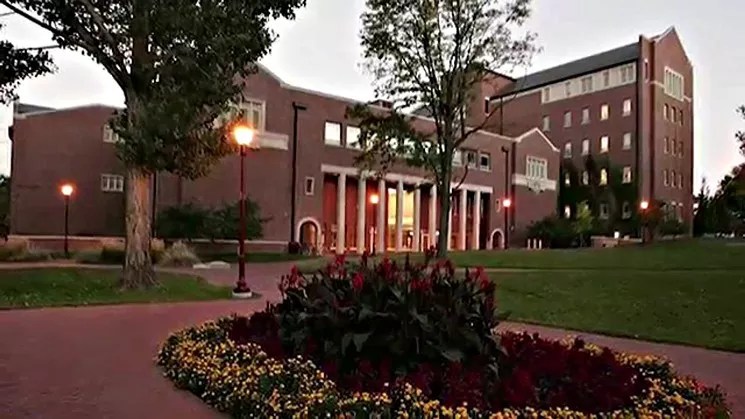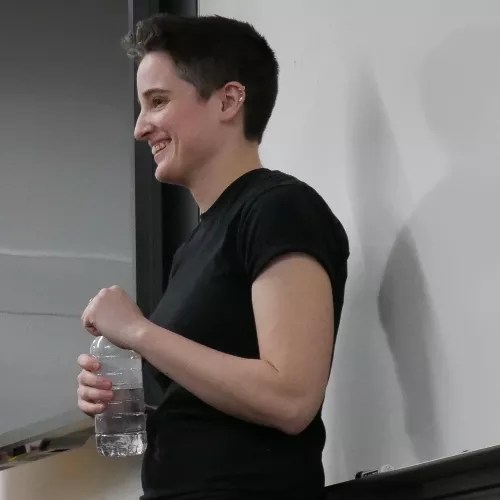

Audio By Carbonatix
A group of visiting and adjunct instructors at the University of Denver claims that contingent faculty members are being chronically underpaid by the nationally respected institution, with the pay in some instances falling below the minimum wage. In other words, at times professors are making less for teaching students than they would if they were serving them a meal at McDonald’s.
DU insists that its compensation for contingent faculty is on par with that offered by other colleges in the area, and disputes some of the assertions made by the organization, formally known as the Contingent Faculty Organizing Committee (CFOC), including the minimum-wage claim. The university also maintains that it’s doing more than ever before to support such instructors, even as it stresses that many of them are part-timers who are supplementing their income from other gigs.
A CFOC fact sheet lays out many of its concerns. Here are some key bullet points:
• Adjunct faculty teach at least 30 percent of the credit hours across the university and at least 85 percent of the credit hours in two units.
• Adjunct faculty at the University of Denver work from one quarter to the next, and the base rate for a ten-week course is $4,150…. Compared to the living wage in Denver of $36K, a faculty member would have to teach nine courses per year just to be above poverty. Yet, the University generally caps the number of courses at six or fewer to avoid paying benefits.
• Compare adjunct faculty pay to the amount the university earns from a four credit-hour class. After an average discount, students pay $4,250 for four credit-hours, and the average class size is 21. The University earns $89,250 per course but pays adjunct faculty only a base rate of $4,150 per course. While the base rate for adjunct faculty is $4,150, some parts of the university even evade the base rate by paying a piece rate according to the number of students. With a minimum set at $600 for a ten-week course, a conservative estimate of thirty class hours, thirty preparation hours, and thirty grading hours would mean faculty earn $6.66 per hour. This is below minimum wage.
• At such wages, many adjunct faculty are driven into poverty, qualifying for Medicaid and food stamps because their earnings from DU are so low. Essentially, DU is making taxpayers subsidize its low wages.
Among the leaders of the CFOC is Lucy Cane, a visiting teaching assistant professor in DU’s political science department. “I’m on a nine-month contract,” she notes. “I arrived in September 2019, did one year, and was hired for a second year – and my contract is about to end. I teach eight courses a year as a visiting professor, and last year, I taught more classes, published more research and did a lot more class preparation than many of my tenure-track colleagues – and yet they were paid over 60 percent more than me. So you can see there’s a huge class division in terms of the compensation for the work we’re doing – and I’m not even an adjunct, which is the lowest on the hierarchy. They are usually paid less per course than a visiting professor, they don’t have health insurance through the university, and they have no job security from one quarter to the next.”
The $4,150 base rate cited by CFOC is deemed inaccurate by DU. But according to a pay-scale document provided by Cane, the amount of pay for a ten-week course, which typically calls for two meetings of around two hours per week, plus many more hours of prep time, grading and more, differs depending upon how many students are enrolled. If there’s just one student in the class, the pay is $600. The amount doubles to $1,200 for two students, goes to $2,400 for three students, hits $2,650 for four to eight students, $3,750 for nine to fourteen students, and lands at $4,150 for fifteen to 24 students. As a result, Cane maintains, “DU drops the pay when classes are under-enrolled. The fewer students who enroll, the less the faculty members get, which is totally inappropriate shifting.”

Lucy Cane is finishing up her second year as a visiting faculty member at the University of Denver.
DU’s underpayments are hardly unprecedented, Cane emphasizes. She also served as a visiting professor for Beloit College, a small liberal-arts school in Wisconsin, “where I didn’t feel I was properly compensated or respected, either. But the gap between my compensation for that and others there wasn’t as great, because the institution in general was financially strapped. But DU is a wealthy institution that compensates its tenure-track people well but pays low wages to adjunct and visiting faculty.”
Quotes collected by the CFOC from other members underscore these points. According to Trina Hoefling, “I have taught at University College at the graduate level for well over a decade. … My annual earned income [was] $10,200. … I ended up supplementing my UCOL income with food stamps. I made so little money I was eligible for Medicaid.”
Adds Eva Milko “Teaching at a university level was my dream since I was a child. … When I got the opportunity to teach at University of Denver as an adjunct professor, I was ecstatic. … My annual income for those three years was low enough to be considered “working poor,” qualifying me for food stamps and Medicaid. For the first time in my adult life, I could not afford to pay my mortgage or pay for my medication. I struggled to understand how this was possible, while the dean looked away. … I was not allowed to teach more than two classes because I was told that anything above three classes would trigger different employment status.”
As Laurel McMechan points out, “I am new to teaching at DU but have taught as contingent faculty at five-plus schools. … All of us faculty who are teaching, regardless of being adjunct or tenure track, are impacted by the University’s exploitive low payment for our work. Any undermining of our teaching undermines ALL of our teaching. … Why can’t we just have agreed-upon salary per credit hour for all faculty? We are good enough to get hired and do our work, but not good enough to support like all the other staff on campus.”
The committee has earned support from some tenured DU staffers, including Aaron Schneider, a chaired professor at the Josef Korbel School of International Studies. He believes that pay for contingent faculty is “unacceptable. It’s embarrassing, it’s illegal, and it needs to be fixed.”
Presented with the committee’s claims, the university offers a multi-layered response in a statement. “The University of Denver has undertaken efforts historically, and more recently has redoubled efforts, to support our adjunct faculty,” it begins. “Adjunct faculty are a heterogeneous group comprised of full-time professionals, and sometimes recent or current graduate students, who teach DU students in every college. Many have been teaching at DU or elsewhere for many years, while others are just beginning their careers. According to the most recent census data (fall 2020), DU employs 740 full-time instructional faculty, 28 part-time benefited instructional faculty, and 743 adjuncts. Most of our adjunct faculty teach one course. … Importantly, DU unequivocally states that no retaliation or undermining of the principles of academic freedom will ever be tolerated on this campus. Our adjunct faculty are an integral part of our community and reflect our educational breadth.”
DU’s list of assistance for adjunct faculty includes the following:
• Offering support to adjunct faculty is essential to DU’s educational mission – especially since national data suggests that adjuncts can face specific challenges to finding peer cohorts, making it difficult to acclimate or feel like part of an academic community. While the most important connections for adjunct faculty come from college and program onboarding, we are taking steps to offer optional, university-level onboarding and support to cultivate a sense of community among our adjunct faculty.
• Orientation will focus on connecting adjuncts with resources in their college and across campus and fostering connections with other part-time faculty members.
• Adjunct faculty are eligible for professional development opportunities that include stipends through the Office of Teaching and Learning.
Additionally, DU says that some of the CFOC’s contentions about compensation are simply wrong.
“For our part-time adjuncts, this year the pay rate was increased in spring term, at the same time the University announced a 2 percent cost-of-living adjustment for all benefited employees making less than $90,000,” the response states. “For a fully enrolled course, the base pay rate for a four-credit hour course moved from $4,150 to $4,232, or $1,058 per credit.”
It continues: “In 2014, the IRS provided guidance on how to calculate hours worked for adjuncts. For every hour in class, add 1.25 hours for time spent outside of class preparing or grading. On our ten-week quarter, this would result in a calculated wage of $47/hour ($1,058/10 weeks = $105.80 per week, $105.80/2.25hrs = $47/hour).”
Note that these figures correspond to the maximum amount offered to contingent faculty, not the lower pay for smaller classes.
DU also stresses, “When comparing our adjunct wages to those of other institutions in Colorado, it is important to note that they are on fifteen- to sixteen-week semesters, or a third longer than our quarter system, which is in place in all schools other than the law school. In our analysis, our current salaries per course are competitive within the region. … When the question on the minimum wage was raised by the faculty senate, the provost’s office investigated and determined all units are in full compliance with all labor laws.” Moreover, “many of our adjuncts are employed elsewhere. They are all DU part-time employees. Many are professionals (lawyers, musicians, accountants, managers, communications directors, principals, etc.) in the area in which they teach.”
Of course, many contingent faculty members would like to teach full-time, and Cane argues that the system at DU makes that almost impossible. “DU cares a lot about its reputation,” she says. “It claims to be an institution devoted to the public good and invests a lot in reputation management exercises. But parents and students don’t understand the class distinctions in the faculty. I don’t think my students have any idea how poorly I’m paid or how tenuous my employment is compared to the other professors in the political science department. And the university could hurt its reputation if it doesn’t respond on an ethical basis.”